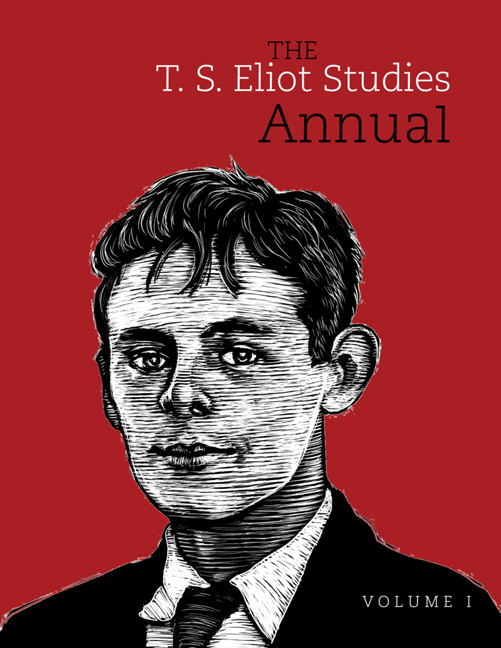Book contents
- Frontmatter
- Contents
- Abbreviations of Works
- General Editor's Note
- The Short and Surprisingly Private Life of King Bolo: Eliot's Bawdy Poems and Their Audiences
- Dull Tom-Tom's Absurd Prelude: Ludic Modernism in Early T. S. Eliot
- Eliot at Bergson's Lectures, 1910–1911
- The American Legacy of “Prufrock”
- Poetry (June 1915)
- The Stale Dregs of Revolt
- Prufrock, Belated
- Eliot's Allusive Legacy and Obscurity in “Prufrock”
- Transmuting F. H. Bradley: T. S. Eliot's Notes Towards a Theory of Poetry
- T. S. Eliot, Phenomenologist
- Astride the Dark Horse: T. S. Eliot and the Lloyds Bank Intelligence Department
- Aristophanic Structures in Sweeney Agonistes, “The Hollow Men,” and Murder in the Cathedral
- Eliot and Virgil in Love and War
- T. S. Eliot Bibliography 2014
- Notes on Contributors
Eliot and Virgil in Love and War
- Frontmatter
- Contents
- Abbreviations of Works
- General Editor's Note
- The Short and Surprisingly Private Life of King Bolo: Eliot's Bawdy Poems and Their Audiences
- Dull Tom-Tom's Absurd Prelude: Ludic Modernism in Early T. S. Eliot
- Eliot at Bergson's Lectures, 1910–1911
- The American Legacy of “Prufrock”
- Poetry (June 1915)
- The Stale Dregs of Revolt
- Prufrock, Belated
- Eliot's Allusive Legacy and Obscurity in “Prufrock”
- Transmuting F. H. Bradley: T. S. Eliot's Notes Towards a Theory of Poetry
- T. S. Eliot, Phenomenologist
- Astride the Dark Horse: T. S. Eliot and the Lloyds Bank Intelligence Department
- Aristophanic Structures in Sweeney Agonistes, “The Hollow Men,” and Murder in the Cathedral
- Eliot and Virgil in Love and War
- T. S. Eliot Bibliography 2014
- Notes on Contributors
Summary
In his 1950 talk to the Italian Institute in London, “What Dante Means to Me,” Eliot stated that “One test of the great masters” is that the appreciation of their poetry is a lifetime's task, “because at every stage of maturing—and that should be one's whole life—you are able to understand them better. Among these are Shakespeare, Dante, Homer and Virgil.”
Although he had appreciated Virgil since boyhood, having read The Aeneid in Latin at Smith Academy and, according to his longtime friend Mary Hutchinson, usually carried a copy of either Dante or Virgil, he wrote little on Virgil before 1944. That year he wrote the first of two major essays on Virgil—“What is a Classic?”—which focuses on Virgil's value in literary terms as “providing us with a criterion,” a “standard of the classic” as the culmination of a process of maturation in language, style, and manners. He adds to that what he calls “comprehensiveness.” The significance of this for Eliot could hardly be overstated because in Virgil, he claims, comprehensiveness “is due to the unique position in our history of the Roman Empire and the Latin language; a position which may be said to conform to its destiny.”
He identifies this sense of destiny with that of Aeneas, whom he calls “the symbol of Rome,” one who is “at the centre of European civilization.” For Europe, in what he considered his own developed understanding, is a whole, and only Roman literature could be universal. He concludes with an image he was to use again: Virgil as the “great ghost” who “as it was his function to lead Dante towards a vision he could never himself enjoy, led Europe towards the Christian culture which he could never know.” Eliot emphasizes, moreover, the wholeness of European literature premised on an idea of European culture that he encountered in Charles Maurras in the Paris year, and that he sustained and developed throughout his life. European culture was, in Kenneth Asher's words, “for Maurras … synonymous with nothing less than the great tradition of Western culture itself that, originating in Greece, passed to ancient Rome and hence, via the Roman Catholic Church, to Latin Europe.” And according to Maurras, “We conceive of it as the regime of Order.”
- Type
- Chapter
- Information
- The T. S. Eliot Studies Annual , pp. 177 - 196Publisher: Liverpool University PressPrint publication year: 2017



